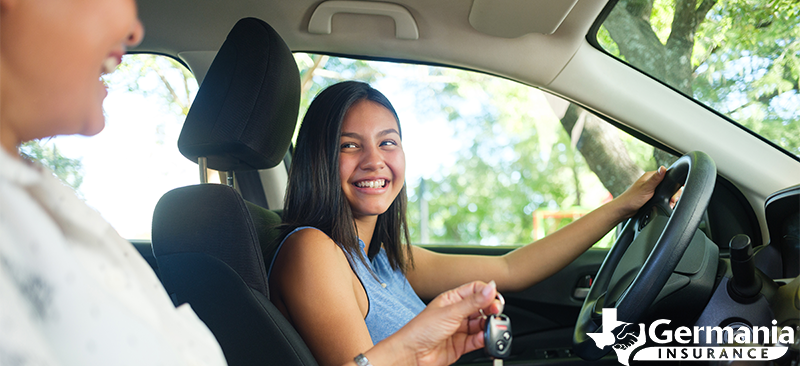Set your teen up for success with these tips for first time drivers.
 Deciding to get a driver’s license is a sign of your teen growing more independent
Deciding to get a driver’s license is a sign of your teen growing more independent. But before your child leaves the nest to get behind the steering wheel of a car, they’ll need your guidance to make sure they remain safe on the roads.
The exciting and fun milestone of getting a driver’s license can lead to some nerve-wracking situations. In fact, according to the Department of Motor Vehicles, teen drivers account for more auto accidents than any other age group. This is why proper teen driver education and safe driving practices are critical to keeping your teen safe on the roads.
Risks that teen drivers face
Driving is a high-risk activity for even the most cautious adult. Young drivers are even more at risk without the same maturity, skill, or experience as adult drivers. For example, due to new teen drivers’ inexperience, they are
3 times more likely to experience a fatal car crash during nighttime driving than an experienced adult. And while adults may be able to manage a car full of kids, teens who have just two other teens in the car with them double or triple their likelihood of getting into a car crash. With 2,500 teens dying in car crashes every year, taking steps toward safer teen drivers is imperative.
Safe driving tips for teens
Teens are new to driving and may inadvertently engage in risky behaviors, speed, make mistakes, or get easily distracted. A key component to preventing auto accidents is having a parent–teen talk with your child about ways to be safe. But even experienced drivers may need to figure out exactly which factors to touch on.
Here are some tips you can give your child about teen driver safety:
Know your car and car insurance
Before your teen even starts the ignition, it’s a good idea to make sure they know just how their vehicle works. Going through the owner’s manual to stay informed about their car’s
safety features, what the dashboard lights are and what they indicate, and practical information such as where to locate the spare tire could make you and your teen feel safer. Along with the manual, knowing how to open the car hood,
change a tire, check fluid levels, and other car maintenance would be a bonus.
Once you’re in the car, show your teen how to adjust their driver settings, like adjusting their seat to reach the pedals without hitting the dashboard and adjusting the mirrors so they have the best view of the road ahead and behind them. Encouraging your teen to make a routine out of making these adjustments will help them do these tasks every time they get in their car. Though it may seem tedious, setting a standard for your teen will help them ward off lousy driving habits before they even begin.
When they know their way around their vehicle, going over the
basics of their car insurance can increase their sense of responsibility. This is also a great time to remind your teen that maintaining a clean driving record can help them obtain cheaper car insurance in the future.
Stay aware
Once your teen is ready to hit the road, you’ll want to remind them to always stay aware as they drive. Keeping an eye on the gas gauge will ensure they aren’t damaging their car or getting in a risky situation by running out of gas. They must ensure the coast is clear before driving through stop signs or intersections, even when the light is green. And if they’re driving, especially at
dusk or dawn, they should
keep an eye out for animals. Teens should also be aware of where they are driving, whether on a highway, neighborhood, or school zone, to make sure they adjust their speed and are aware of changing protocols as they drive. This includes stopping for emergency vehicles.
No one, even adults, can always anticipate what other drivers will do next. Let your teen know they should always
practice defensive driving by keeping their eyes on the road and checking their side view and rearview mirrors every 15–30 seconds. They should stay alert to what drivers around them are doing and maintain a safe driving distance between them and other drivers. Staying at least one car length behind the car in front of them, or even more if they are driving faster, is an excellent practice. If a vehicle is tailgating them, they should let them pass when it is safe to do so.
Minimize distractions
It’s increasingly difficult not to get distracted in today’s world. It’s tempting for any teen to want to multitask while driving—eating, drinking, playing music, or filling their car with friends. But it’s important not to fill the vehicle with distractions that can make their mind or eyes wander for even a few seconds. According to the
National Highway Traffic Safety Administration, of the car crashes reported,
distracted driving is the leading cause of car crashes. Inexperienced drivers are more likely to lose control of their cars, and those odds increase when they are too distracted to notice impending danger in a timely fashion or at all.
Encourage your teens to keep their phones on “do not disturb”, and out of arm's reach if possible. If there’s an emergency, they should pull over before making their call. And while it may seem like a downer at first, preventing your child from driving with teen passengers in the car until they have sufficient experience will give them time to build their driving skills without the escalated risk of distraction.
Turn on your headlights and use your blinkers
Using your headlights increases your visibility, helping other drivers see you, especially at dusk or early morning. However, the DMV suggests using your headlights even when you feel that it’s too light outside to need them.
Blinkers let other drivers know when you are changing lanes, passing, or turning. Without this heads-up, dangerous cut-offs, fender benders, or car crashes become more likely.
Wear your seatbelt
According to Safe Kids, more than half of teens killed in car accidents were not using their seat belts. Encouraging your children to take this simple precaution could save their life. And if you as a parent don’t participate in
seat belt use, this would be the best time to begin so your kids can model after you.
Keep off your phone while driving
While using a cell phone while driving may not seem like a big deal, the DMV revealed that studies indicate that using a cell phone, even a hands-free device, is the equivalent of drinking and driving. And if the driver is texting, it only takes 4.6 seconds of not looking at the road to drive the length of a football.
This issue is so severe that many states have laws prohibiting the use of cell phones while driving, and even reaching for your phone while stopped can lead to a traffic law violation. Encourage your teen to put their phone on “do not disturb” and to keep it out of arm's reach. If there’s an emergency, they will be able to pull the car over and then make their call or send their text.
Obey the speed limit
It can feel cool or even necessary to drive above the speed limit, but let your teen know that they must obey the speed limit. Traffic violations can increase the premiums offered by auto insurance companies; more importantly, speeding is a significant factor in fatal teen car accidents, especially on unfamiliar roads or roads with heavy traffic. Driving at a safe speed helps ensure their well-being.
Drive above the influence
It’s hard to imagine your teen under the influence at all, much less while driving. Unfortunately, according to the
Centers for Disease Control and Prevention, 29 people die in motor vehicle crashes involving impaired driving daily. And 15% of drivers between 15–19 who were killed in crashes had blood alcohol levels of .08% or higher. Because of this, it’s important to cover “what if” situations with your teen to minimize risk in any case.
Let your child know that driving under the influence of drugs, alcohol, cannabis, and prescription drugs is illegal. If your child finds themselves under the influence, they should not get behind the wheel. And if they are with someone who is under the influence who wants to drive, they should not get in the vehicle.
Things you can do as a parent to help your teen driver
Now that you know what your teen needs to know, it’s time to talk about ways you can help set your teen up for success.
Get familiar with your state’s graduated driver licensing (GDL) system
The
graduated driver licensing system limits high-risk driving situations for new drivers, reducing your teen’s car accident risk by as much as 50%. GDL programs resulted from the Graduated Driver’s Licensing Law that was passed in all 50 states and the District of Columbia.
Set ground rules for your teen
While following the law and lessons from their driving school is crucial, when it comes to your teen, it may be beneficial to create your own set of rules. Limiting the number of passengers or setting a driving curfew can help reduce distractions while driving. Consequences for breaking these rules could include suspending their driving privileges, limiting where they can drive, or limiting cell phone use. Discussing why these rules exist is key to helping your teen understand that driving safety is essential.
Be a role model for your teen
Talking about the rules and regulations of the road is imperative to your child being a safe driver. However, kids of any age tend to absorb our actions just as much, if not more, than our words.
As you and your teen embark on this milestone together, staying engaged in your child’s journey will help keep them safe at home and on the road. Tell them about your experiences, and remind them that driving is a skill. With everyone working together, we can ensure the roads stay safe for all of us.
 For more information about Germania and our insurance products, request a free quote online, or reach out to one of our trusted agents today!
For more information about Germania and our insurance products, request a free quote online, or reach out to one of our trusted agents today!